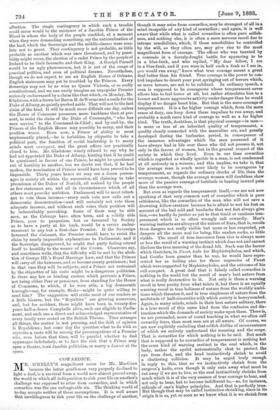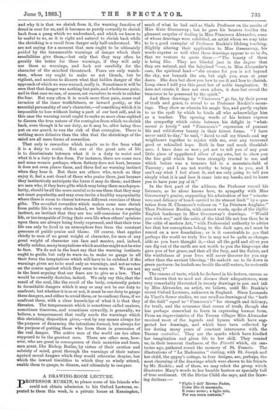COWARDICE.
MR. O'KELLY'S magnificent scorn for Mr. MacCoan because the latter gentleman very properly declined to fight a duel, is a survival from a world now almost passed away, the world in which all indisposition to risk your life on another's challenge was supposed to arise from cowardice, and in which cowardice was the one unforgivable sin. The thinking world of to-day accepts neither of these assumptions. It is well aware that unwillingness to risk your life on the challenge of another, though it may arise from cowardice, may be strongest of all in a mind incapable of any kind of cowardice ; and again, it is well aware that while what is called cowardice is often pure selfishness, and nothing else, it is often a mere nervous recoil due to intense sensibilities, which, if these sensibilities be controlled by the will, as they often are, may give rise to the most magnificent form of courage. The officer who was taunted by a comrade in a fiercely-fought battle for appearing to be in a blue-funk, and who replied, "My dear fellow, I am in a blue-funk, and if you were in half such a funk as I am in, you would run away," knew what true courage meant a great deal better than his friend. True courage is the power to control impulses to desert your post springing out of terrors which, as mere terrors, are not to be subdued. In ordinary speech, a man is supposed to be courageous whose temperament never allows him to feel terror at all, but rather stimulates him to a keener and more aggressive activity under danger than he would display if no danger beset him. But that is the mere courage of temperament. It is a far higher courage which, from the mere sense of duty, can keep down these impulses to run away, and probably a much rarer kind of courage as well as a far higher kind. The truth, doubtless, is that physical courage—in men— is more or less of an inherited quality of temperament, a quality closely connected with the masculine sex, and greatly developed during the barbarian period, in consequence of the immense advantages which the men possessed of it have always had in life over those who did not possess it, not only in the favour of women, but in the general respect of the society in which they lived. Even in our time cowardice which is regarded as wholly ignoble in a man, is not condemned at all seriously in a woman; and this implies, we take it, that the average man is much more likely to be courageous by temperament, as regards the ordinary shocks of life, than the average woman, though the average woman will doubtless show more of the passive courage of fortitude in bearing inward pain than the average man.
But even as regards the temperament itself,—we are not now speaking of that very common sort of cowardice which is pure selfishness, like the cowardice of the man who will not save a drowning fellow-creature because he is afraid to wet his feet on account of the bad cold and headache that wet feet always give him,—we hardly do justice as yet to that timid or cautious temperament which is so often wrongly call cowardly. Man's warning instincts are always of the nature of fears, that is, recoils from dangers not really visible but more or less suspected, yet dangers all the more real for being, like sunken rocks, so little visible. The recoil of true innocence from vice is always more or less the recoil of a warning instinct which does not and cannot disclose the true meaning of the dread felt. Such was the horror which Gretchen, in Faust, feels for Mephistopheles, and which, had Goethe been greater than he was, he would have represented her as feeling also for those urgencies of Faust which were suggested by Mephistopheles, and the outcome of his evil compact. A great deal that is falsely called cowardice is nothing in the world but the recoil of man's best nature from what is really destructive to it. Not only is there a warning recoil in true purity from what taints it, but there is an equally warning recoil in true holiness of nature from the worldly ambitions which threaten it, and in true singleness of nature from the multitude of half-sincerities with which society is honeycombed. Again, in many minds, minds in their best nature solitary, there is a true recoil of this same kind from the confusion and distraction which the demands of society make upon them. There is, we are persuaded, more of sound teaching in what we often call cowardly fears, than most men are at all aware. Of course, we are now explicitly excluding that selfish dislike of inconvenience of which we entirely understand the meaning and the scope. That is cowardice for which nothing is to be said. But much that is supposed to be cowardice of temperament is nothing but the same kind of warning instinct in the soul which, in the body, makes the eyelid automatically shut to protect the eye from dust, and the head instinctively shrink to avoid a shattering collision. It may be urged truly enough in reply to this, that as we instinctively shrink from the surgeon' a knife, even though it only cuts away what must be cut away if we are to live, so the soul instinctively shrinks from much which it is of the very essence of true courage to bear, and not only to bear, but to become indifferent to,—as, for instance, ridicule of one's higher principles. And that is perfectly true. But though that may be calla instinctive shrinking, since in its origin it is so, yet so soon as we know what it is we shrink from and why it is that we shrink from it, the warning function of dread is over for us, and it becomes as purely cowardly to shrink back from a pang which we understand, and which we know to be useful to us, as it is right and natural to shrink back while the shrinking is a recoil from danger only half-understood. We are not saying for a moment that men ought to be ultimately guided by the innumerable warnings of danger which their sensibilities give them,—bat only that they may often be greatly the better for these warnings, if they will only use them as warnings, and look out carefully for the character of the mischief threatened. Fears are only watchmen, whose cry ought to make us not blench, but be vigilant, and anxious to discern what that hidden danger of the approach of which we were warned, really is. Sometimes it will be seen that that danger was nothing but pain, and wholesome pain; and in that case we can, of course, set ourselves to work to subdue the fear. But very often it is much more than pain, some real invasion of the inner truthfulness, or inward purity, or the essential personality of one's character,—of something which it is impossible to lose without losing a part of our best self, and in this case the warning recoil ought to make us more clear-sighted to discern the true nature of the contagion from which we shrink back, even though it be our duty, as it may be, after being thus put on our guard, to ran the risk of that contagion. There is nothing more delusive than the idea that the shrinkings of the mind are all mere forms of cowardice.
That only is cowardice which impels us to flee from what it is a duty to resist. But one of the great arts of life is to discriminate between what it is a duty to resist and what it is a duty to flee from. For instance, there are some men and some women perhaps, whom flattery does not hurt, because it does not even please them, and these feel no warning instinct when they hear it. But there are others who, much as they enjoy it, feel a sort dread of those who praise them, just because they instinctively anticipate the harm it may do them; and there are men who, if they have gifts which may bring them much popularity, should be all the more careful so to use them that they may not court popularity, and may even invite a healthy unpopularity where there is room to choose between different exercises of these gifts. The so-called cowardice which makes some men shrink from public life is very often indeed, we believe, a true warning instinct, an instinct that they are too self-conscious for public life, or too incapable of living their own life when others' opinions upon them are always being freely expressed, and that their true life can only be lived in an atmosphere free from the constant pressure of public praise and blame. Of course, that applies chiefly to men of no great weight of character, for men of any great weight of character can face and master, and, indeed, wholly subdue, many temptations which another might not be wise to face. We do not in the least say that the warning instincts ought to guide, but only to warn us, to make us gauge in all their force the temptations which will have to be subdued if the warnings given are to be used only as warnings, and not as vetos on the course against which they seem to warn us. We are not in the least arguing that our fears are to give us a law. That would be cowardly doctrine, indeed. We only say this, that the recoil of the soul, like the recoil of the body, constantly points to formidable dangers which it may or may not be our duty to confront; but whether it is so or not, it must be our duty to gauge these dangers, and either to avoid them, or to confront them, if we confront them, with a clear knowledge of what it is that they threaten. The temperament which is sometimes called anxious, sometimes timorous, and sometimes cowardly, is generally, we believe, a temperament that really needs the warnings which this shrinking disposition gives,—not by any means always for the purpose of disarming the intentions formed, but always for the purpose of putting those who form them in possession of the real danger. The active men of the world are too often supposed to be the greatest men. There are other men, however, who are great in consequence of their anxieties and fears, men great, like Bishop Butler, by virtue of their caution and sobriety of mind, great through the warnings of their nature against moral dangers which they would otherwise despise, but which the inward timidities to which they so wisely attend, enable them to gauge, to disarm, and ultimately to conquer.



































 Previous page
Previous page